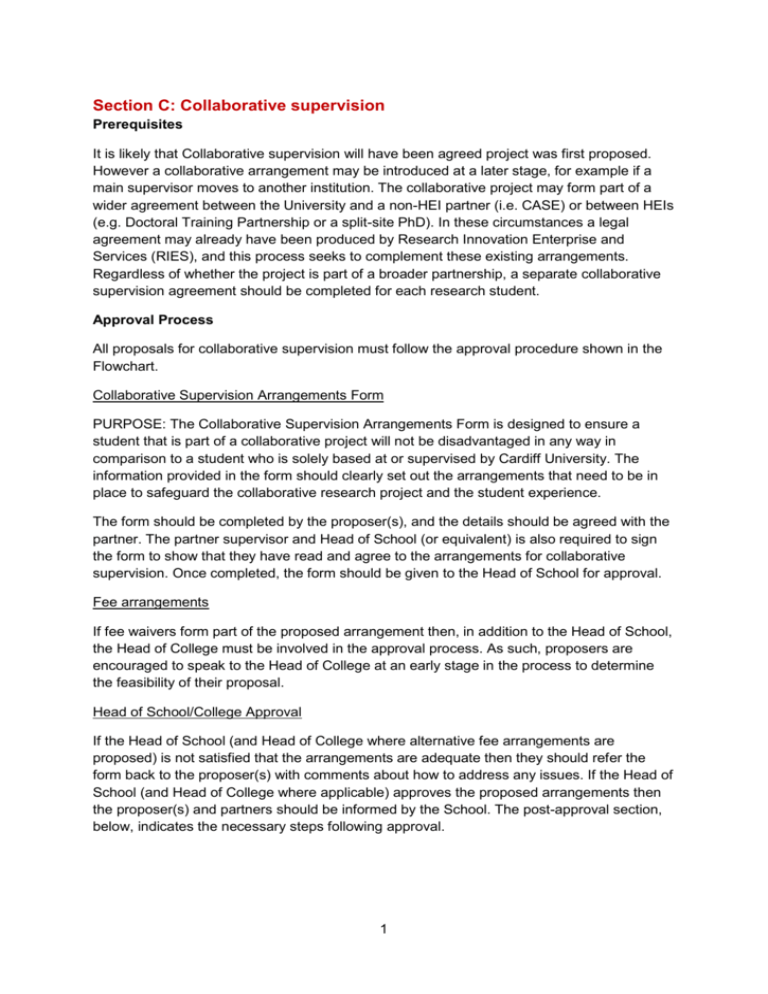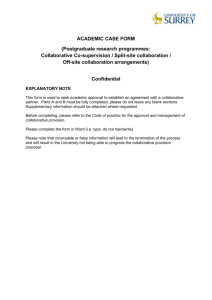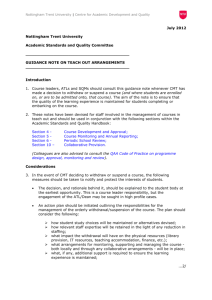PGR Collaborative supervision
advertisement

Section C: Collaborative supervision Prerequisites It is likely that Collaborative supervision will have been agreed project was first proposed. However a collaborative arrangement may be introduced at a later stage, for example if a main supervisor moves to another institution. The collaborative project may form part of a wider agreement between the University and a non-HEI partner (i.e. CASE) or between HEIs (e.g. Doctoral Training Partnership or a split-site PhD). In these circumstances a legal agreement may already have been produced by Research Innovation Enterprise and Services (RIES), and this process seeks to complement these existing arrangements. Regardless of whether the project is part of a broader partnership, a separate collaborative supervision agreement should be completed for each research student. Approval Process All proposals for collaborative supervision must follow the approval procedure shown in the Flowchart. Collaborative Supervision Arrangements Form PURPOSE: The Collaborative Supervision Arrangements Form is designed to ensure a student that is part of a collaborative project will not be disadvantaged in any way in comparison to a student who is solely based at or supervised by Cardiff University. The information provided in the form should clearly set out the arrangements that need to be in place to safeguard the collaborative research project and the student experience. The form should be completed by the proposer(s), and the details should be agreed with the partner. The partner supervisor and Head of School (or equivalent) is also required to sign the form to show that they have read and agree to the arrangements for collaborative supervision. Once completed, the form should be given to the Head of School for approval. Fee arrangements If fee waivers form part of the proposed arrangement then, in addition to the Head of School, the Head of College must be involved in the approval process. As such, proposers are encouraged to speak to the Head of College at an early stage in the process to determine the feasibility of their proposal. Head of School/College Approval If the Head of School (and Head of College where alternative fee arrangements are proposed) is not satisfied that the arrangements are adequate then they should refer the form back to the proposer(s) with comments about how to address any issues. If the Head of School (and Head of College where applicable) approves the proposed arrangements then the proposer(s) and partners should be informed by the School. The post-approval section, below, indicates the necessary steps following approval. 1 Post Approval Having secured the approval of the Head of School and signed agreement from the collaborating partner(s), the collaboration should be recorded on the School register of CP activity and filed for future reference. Two copies of the form should be provided to the student as soon as possible. Both copies should be signed by the student before one is returned to the School and the other is retained by the student. This is an important step in the process for Collaborative Supervision as it demonstrates the student is aware of the arrangements for their supervision and provides key information about what they can expect from the collaboration. In addition, students that will spend a period of time away from Cardiff must be apprised of the contact details of the person responsible for him/her while they are based at the collaborating partner. 2 Collaborative supervision (Individuals) Existing project Initiated Develop details of arrangements Draft collaborative supervision agreement form Consultation with partner Collaborative supervision agreement HoS(s) approval HoC(s) approval (if applicable) Student signs to acknowledge agreement and is provided with copy of Agreement Form 3 Key documentation The following documentation should help to guide those seeking approval for collaborative research degrees. Information on research degree study: The Code of Practice for Research Degrees (http://learning.cf.ac.uk/quality/pgr/code/) details Cardiff University’s expectations and requirements for research degree study and should be adhered to for all proposals for single awards of Cardiff University. In the case of Joint Awards, it is our expectation that the proposed arrangements should be closely aligned with the principles of the Code of Practice. Cardiff University’s Senate Regulations (http://learning.cf.ac.uk/quality/regs/) covers a number of regulations specific to Research Degree study: Criteria for the award of Research Degrees, Progress Monitoring, Examination Procedure, Absence, Extenuating Circumstances, and Appeals. The QAA’s Quality Code, Chapter B11 http://www.qaa.ac.uk/en/Publications/Documents/quality-code-B11.pdf sets out the QAA’s expectations and indicators of best practice in relation to Research Degree study at UK Higher Education providers. Information on collaboration: The Collaborative Provision Policy Framework (http://learning.cf.ac.uk/quality/provisionothers/) sets out Cardiff University’s policy on collaboration more broadly, and provides useful information about the purpose of a number of key documents such as the Initial Concept Form, Business Case and Due Diligence. The QAA’s Quality Code, Chapter B10 (http://www.qaa.ac.uk/en/Publications/Documents/quality-code-B10.pdf) sets out the QAA’s expectations and indicators of best practice in relation to collaboration with partners in UK Higher Education providers. 4







